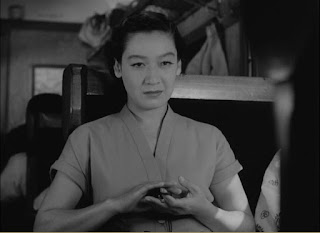After seeing so many of Ozu’s films, although their focus
was family life in Japan, the characters in his films are very universal. … I
can see my father, my mother, my brother and sister, and sometimes myself too.
It’s like reflections in a mirror. Director, Stanley Kwan
One of the extras in this superb BFI issue, is the 1993
documentary, Talking with Ozu, a tribute to the legendary director
featuring diverse filmmakers such as Lindsay Anderson, Claire Denis, Hou
Hsiao-hsien, Aki Kaurismäki, Paul Schrader and Wim Wenders. Hong Kong based Stanley
Kwan lost his father in his early teens and credits Ozu’s films as helping him
grow up after watching them at film school. Kwan recognised his loss from the
first time he saw Tokyo Story through to early silent films such as I Was Born,
But… where the children only come to realise the reality of their father’s work
pressures gradually; they thought he was a superman but now they appreciate his love for them in a new way.
Ozu cuts quietly and deeply across the ages of film and it doesn’t
matter where you’re from, you will still be affected by his humanity.
 |
| Setsuko Hara |
Ozu had always dealt with family and with The Brothers and Sisters of the Toda Family (1941), had already created a similar multi-generational drama which hinged on the same motif of grown-up children not being respectful enough to their older parents. It’s included on this release so you can see the thematic similarities for yourself.
 |
| Chishū Ryū |
Tokyo Story has been restored before but as the original
negative was lost in a fire, until now prints have come from a duplicate
negative, now this new 4k restoration, takes advantage of the latest technology
and the film has never looked better or at least, not for some 67 years. In
lieu of the NFT re-opening anytime soon, this is the best opportunity to watch
this story in the best quality – it is jaw-droppingly clean!
  |
| Tokyo contrasts: old and new, clean and dirty |
Eldest son Koichi (Sô Yamamura) is an over-worked general
practitioner in one of Tokyo’s more hard-pressed suburbs. He is married to
Fumiko (Kuniko Miyake) who struggles with their two wilful sons one of whom
complains after his desk is moved to accommodate his grandparents’ stay… it’s a
foretaste of what is to come. Shukishi and Tomi duly arrive and after their day
out with Koichi is cancelled after a medical emergency for one of his clients,
it’s clear that he will struggle to find time for them.
 |
| Shukishi and Tomi travel in hope. |
The warmest welcome comes from Noriko (the sublime Setsuko), the wife of their eldest son who died in the Second World War. Noriko
still cherishes her dead husband and thinks nothing of putting herself before
his parents. She takes a day off to look after them and willingly gives them
her time. Yet, Shukishi and Tomi worry that Noriko has spent too long mourning
and urge her to move on and re-marry even though she is seemingly content.
 |
| Parental planning: Kuniko Miyake and Sô Yamamura |
It is revealed later that Shukishi’s job had been as head of
education, he was a high-flyer and this could explain his drink problem and the
distance of some of his children… as well as his view of their positions. Ozu
was so aware of the pressures of work on quieter personalities and the toll it
took and the props that were used.
 |
| Haruko Sugimura |
Will grief melt the family squabble and who will put duty
ahead of self-interest, as if things were that simple. The scenes of Noriko
with Shukishi are the heart of the film’s closing sequence as she reveals her feelings
of unworthiness but father-in-law wants only for her to move on; am echo of Late
Spring… He gives her Tomi’s watch as a keepsake – a more meaningful memento
than Shige asked for or was given.
You’d have to have a heart of stone not to be in tears by this stage and for all the right reasons, yet Tokyo Story is a film full of real characters who are all flawed and weighed down by life and responsibility. Ozu called it his most melodramatic film and this possibly appeals more to western audiences. It still operates around a relatively narrow emotional band and the depth of feeling is all the stronger for that. It is an ordinary story but those are, ultimately, the most resonant.
The performances are superb with Chishû Ryû being especially
impressive – a 50-year old playing a man 20 years older. Setsuko Hara is, of
course, a wonder, managing to convey so much with such calm economy and the subtlest changes of expression using what must undoubtedly be, the kindest face in all cinema.
In addition to Ozu’s Brothers and Sisters of the Toda
Family (1941) and Talking with Ozu (1993), there’s a host of special
features, including a surprising trip to Sheffield!
An Introduction to Tokyo Story (2020, 26 mins)
from Asian-cinema expert Tony Rayns. Furnival and Son (1948, 19 mins):
recounts the difficult choice a recently demobbed serviceman has to make
between an unexpected job offer elsewhere, and resuming his pre-war position as
his father's right-hand man in their small cutlery firm, Furnival and Son
There’s also an image gallery and a fullsome illustrated
booklet, including an essay by Professor Joan Mellen, archival writing by John
Gillett and Lindsay Anderson and a biography of Yasujirô Ozu by Tony Rayns.
This is with the first pressing only, so get in quick!





+colour.png)









No comments:
Post a Comment